Zarnell Fitch is a Rock Star Football Recruiter
The defensive line coach talks about recruiting and his admiration for Coach Gary Patterson.
Zarnell Fitch is a Rock Star Football Recruiter
The defensive line coach talks about recruiting and his admiration for Coach Gary Patterson.
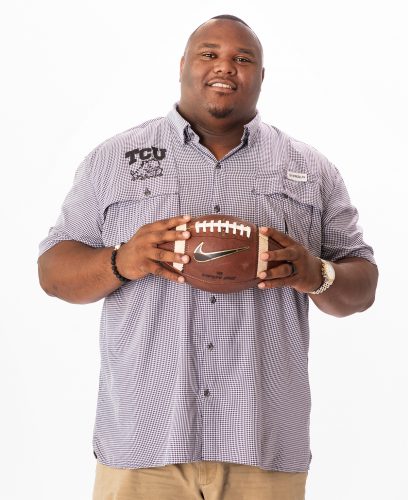
Zarnell Fitch is the defensive line coach for the TCU football team. Photo by Glen E. Ellman
How did you get into coaching?
I knew I wanted to coach. After the NFL I knew that I wanted to set seeds here at TCU so hopefully that opportunity kept building that relationship as a player. After I graduated I actually worked as a grad assistant here and then I got picked up by the NFL. I spent a full year as a graduate assistant.
You went to a junior college before coming to TCU. Tell me about what it was like to get someone else’s scholarship and take a nontraditional route to college.
My story is really crazy. I had to go to Navarro community college and from there I signed with Tennessee. I got ruled academically ineligible so I had to go back to Navarro community college and take a course, a three-hour course. During that time my coaches made me the assistant D-line coach. When the D-line coach was released, I became the D-line coach at 19 years old. That’s where the true love for coaching [started]. During the recruiting process [to play for TCU] I got to let Coach Patterson know that I really liked this, this is what I want to be, and if I came to TCU could you mentor me? That’s how it all originally started.
You weren’t recruited right after high school, but you knew you wanted to go to college — it was just a matter of getting a scholarship?
It was a matter of being recruited. When I was in high school, I was only recruited by three schools, so I took the junior-college route, hopefully thinking that would help my overall recruiting and the recruiting process and get more schools to recognize me, and it worked out.
We actually had a guy who was committed to TCU at the time. His name was Earl Anderson. He actually got placed at Navarro, the school I was at. He didn’t make it out, and I had another opportunity, so I came to TCU.
You have a nontraditional route, but it all worked out.
I’m telling my guys right now, there’s always going to be bumps. There were a lot of bumps in the road, but the destination and the goal never changed.
What are the benefits of failure?
I think the No. 1 benefit from it is that it makes you stronger. It has to will you to continue to go and to feel success over and over again, knowing that you can’t be afraid to fail because if you never try it, you never know. It really gave me the mindset: No matter what, don’t stop. I think that’s the reason you see me here now. I came from nothing. Single mom of five kids. Right now I’m on vacation and I haven’t been anywhere. When you’ve come from nothing and you don’t want to go back there, all you know is to work all the time. I think that’s what my head coach knows about me and the other guys, other coaches I’ve talked to. It gives you that will to keep going and whatever you did to be successful to keep going at that.
Your sisters played basketball and your brother played football. What was it like to come from an athletic family?
Very competitive. I would say that was one of the reasons I wanted to play football, to go to college. I saw the look on my mother’s face when my sister Angel went to college. She got signed with Eastern Illinois. Just to know that my mom didn’t have to pay for our education. We really came together as siblings and made a bond, kind of like a pact. Our pact was that our mother was working hard and we didn’t want that stress level on her. She wanted us to go to college. We all sat down and said we are going to use our athletics to get our school paid for to let her know all her hard work isn’t going in vain. We made sure our mom knew we were going to be successful.
What was the dynamic like with other TCU students who come from the same circumstances as you?
It’s kind of crazy because the people I look at as my longtime friends, there’s very few from high school. They’re relationships I made here at TCU. I think it was a respect factor, especially when you’re in the same class as somebody and you understand they have the same workload and you’re putting the same effort in as them, I think that brings kids together.
I loved hearing about where other people are from. I’m a real people person. Getting out and meeting people, that was an easy transition for me. That’s something I tell my guys, even the freshmen: “We’re going to walk up to 10 people you don’t know and you’re just going to start talking to them, hold a conversation. This is your networking.” I would say that was an easy transition. Plus, TCU is a lot smaller, so that made the transition easier.
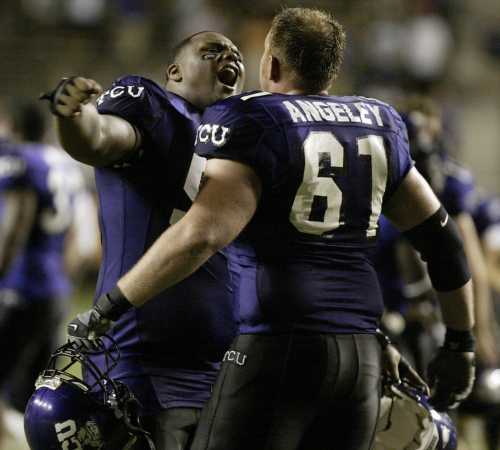
Zarnell Fitch embraces Ben Angeley after TCU defeated Utah in 2005. Courtesy of TCU Athletics
What was it like to come from a small town (Spencer, Oklahoma), land in the Dallas-Fort Worth area and now travel all over for games and recruiting?
I think Fort Worth gives you that city atmosphere and then on the other hand you have the Stockyards. I feel like it gave me the best of both worlds. That was one of the main purposes me and my wife wanted to be here and wanted to come back here: to raise our family in Fort Worth. That was a real big part of the decision.
How did you meet your wife?
She’s from Kingwood, Texas. What’s really cool is that her dad played for Texas and Baylor. She’s the only one out of her family to come to TCU. She had to beg to come to TCU. She’s one of three girls and the other two went to [Texas] A&M. We were best friends here. Never dated. Never kissed. Just best friends. Then when you look back you start seeing the signs. Then you say, OK, you know. It worked out now. A lot of kiddos later and we’re very happy.
Funny story: Her dad called me a couple years back and told me, “You need to check out this kid I’m hearing about in Kingwood.” Yes, Dad, you know, kind of move on. I went and watched the kid. He wasn’t getting a lot of offers. We ended up watching him. I fought for him. Coaches loved him. We offered. That kid ended up being Army All-American. He could have gone anywhere in the country. That’s Sewo [Olonilua]. I was sitting around looking at old pictures of him and I called him. Just random, but it was pretty cool.
What was it like to come back to TCU after eight years?
I left in 2006, came back 2014. I was always around and close to TCU football. That never stopped. The relationship never stopped. When I became head coach at Lincoln High School [in Dallas], one of the big things is that Coach Patterson wrote my letter of recommendation. They were big in the influence that being a young head coach — at the time I was the youngest head coach in the state — they gave me pretty much an open line of communication where I could call those guys.
I don’t care who you are, if you’re a first-year coach and you don’t have a great support system, you’re not going to be successful. We had a successful year that year and that’s because the guys were my support system — Coach Patterson, Coach Glasgow, calling them and asking them: “Am I overthinking this?” “How do I handle this situation?” That’s what a lot of young head coaches need: a great support system that you can reach out to help you. And they helped me a lot.
What does it mean to coach and recruit for your alma mater and team?
Two different aspects: I tell guys it’s really personal. I want TCU to be successful. I know what this school has done for me. I know that this school has helped me provide for my family. They gave me an opportunity when a lot of other people weren’t willing to give me that opportunity. They believed. I tell my players, as a coach it’s easy for me to get up in the morning knowing I’m coming to TCU and I get to coach.
It’s also when you’re coaching guys who have played your position, in the same defense and wear the same colors as you — that’s priceless. That’s truly priceless. There’s not too many who get that opportunity. I want them to be the best. I want them to do everything I did: graduate, go to the NFL, be able to live their life and support their families. At the end of the day, that’s when I know I’ve done my job. That’s what me and my wife talk about: It’s about the day that our players get to come back with their families and they’re doing good.
Are you still close with your TCU teammates?
Oh, yeah. Big-time yes. I get text messages from them all the time — giving me a hard time or telling me they’re proud of me. There was a write-up a couple weeks ago and my phone was flooded. They all come back to the games and we still hang out and talk.
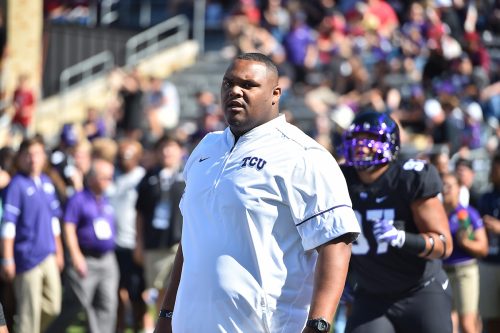
Zarnell Fitch on the sidelines at Amon G. Carter Stadium as TCU faced OU in 2016. Courtesy of TCU Athletics | Photo by Michael Clements
People don’t understand, TCU Football is a fraternity in itself, especially when you have a coach as long as our head coach’s tenure. We all have been groomed and raised by one man.
Everybody has their story: “Coach changed my life because he did this.” “I wouldn’t have been able to get through this time of my life if I hadn’t played at TCU.” You hear that over and over and over again and it’s a reminder that he’s been doing a great job. By seeing the pathway, it’s easy to follow.
Was it difficult to adjust to Patterson as a coach and then as a colleague? How is he different?
As a player, you always assume you know how hard the coaches work. You assume that you know how they care for you. When you come back as a coach, you get to see the time that’s actually put in. The time that’s actually put in to knowing the guys’ academics. You wouldn’t believe how much we just talk about academics in our staff meetings, or just coming around here just talking about our guys.
I think what you see on the other side is how much Coach Patterson loves the guys. As a coach, when I’m back, I don’t mind telling them, “This man talks about you all the time. Do you know how much he loves you and cares for you?” I had a coach tell me that: “Coach is crazy about you.” It does wonders for kids. We all get caught up in different things, but knowing how much he put in and how much him and Mrs. P are all in and want the guys to do good, that’s one of the fun things you get to see behind the doors of a coach.
What did it feel like when Coach Patterson called you a rock star?
One thing we always do is we keep our head down and we stay humble, we just keep working. I’d be lying if I said I didn’t think it was awesome, especially when it’s coming from a future Hall of Famer, someone who has been doing it for a long time and someone I idolize. I’d be lying if I told you it didn’t feel good. It also makes me want to work harder to prove him right.
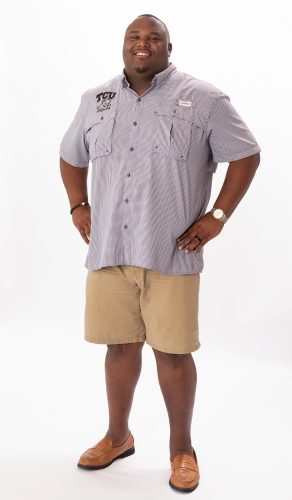
Head Coach Gary Patterson called Zarnell Fitch a “rock star” recruiter. Photo by Glen E. Ellman
We have one of the highest-ranked recruiting classes ever, the second top-25 class in three years (all years you’ve been here). What do you think this means for this season and beyond?
People like to talk about recruiting and things like that, always giving me kudos for recruiting. Usually a coach goes out on the road and you just start recruiting, going to schools. I tell people that I got the format and the way to do it from the coaches that were here. That was the best thing that happened to me because I got to see the relationships they make on the road and how they handle themselves. I attribute any kind of recruiting successes I have to those guys giving me the blueprint. I think about [Defensive Coordinator] Coach [Chad] Glasgow and the relationship he had with my mother while he was recruiting me. Finding out little things that are important to families and making it important to you.
I wish I could sit here and say I came up with all these things by myself, but I was taught by guys who wanted me to be successful. They led me on the road. That’s all dedicated to this staff and allowing me, and wanting to teach me, and wanting me to be successful. I love recruiting. I love recruiting boys here to TCU. But there’s a lot of people here who have groomed me to be the coach and recruiter I am.
There are many more high schools than colleges. How difficult is it to recruit high schoolers? How do you figure out who to watch?
We watch as a full staff. We all have a say in the evaluation process. There’s no position that you are eliminated from. I can see a kid and I’m asking whoever — I can ask the offensive coordinator, anybody, what they think. I think when you make group decisions like that, it’s always for the best. We break it up into areas, so each coach has an area that they recruit.
Mine is the I-20 corridor, which is Duncanville, Cedar Hill, DeSoto, Lancaster, Arlington, Mansfield. And from there, I position-recruit, where now I can go anywhere from California, I’ve been to Utah. I’ve been to places I never thought I would go. You grow from it when it’s important to you. When our coaches are on vacation, I promise you they are recruiting.
That sounds like finding a needle in a haystack.
It is. We’ve just been doing it for a long time. There are certain things we look for that I was taught to look for a long time ago when I was a GA. We watch the film and look for little things. It’s really fun.
Why do you think student-athletes should choose TCU over any other school, even powerhouses?
I think those kids do their research. I think when kids do their research and see the stability here — they see how we’re ranked up, they see the results, they see the educational advantages of TCU, and they see a true family.
The purple is calling for you! #CarterBoys18 #QBHunters #TCU pic.twitter.com/ClcuP92cT3
— Zarnell Fitch (@CoachZFitch) June 1, 2017
You often use #QBHunters on Twitter. How much of a role does social media play in recruiting?
It’s huge, and that’s downplaying it. Social media is useful because it gives student-athletes the opportunity to reach out and touch us. It also gives us a line to talk about the good things TCU has for them. It’s really a billboard. It’s a way that we can put out our message as a university, as a football family, to young guys out there. And they get to see us. They get to see more sides of the coach. Everybody knows Coach P as a Hall of Fame coach who has his own statue here, but it lets you see him as a grandfather. It lets you see us as people. I get to show them I’m a Chris Stapleton fan. It opens you up. That’s what’s cool about it to me: People get to know you not only as a coach.
You were a high school football coach. Do you think that influences your recruiting?
I would say it did help me out a lot, especially at the school I was at. There were a lot of kids who didn’t have the best lives growing up. It showed me that if you show that you believe in a kid how big of a difference it can make.
I take that approach if everybody else can be against you, but if there is someone who believes in you — someone you know is going to have your back — I want to be that person. I have seen that approach make so much difference in a kid’s life and how they turn out, and what they’re doing even now this day. I take that approach, and to be honest, that’s why my family is involved a lot.
I let guys be a part of my family. Having my kids here watching the freshmen run on Tuesday. They’re up and around them. It was my wife’s idea. There was a kid at Lincoln High School [in Dallas] who was having problems and no one could get to him. My wife said, “Let’s just go to a soccer game.”
We went to a soccer game and after that, just putting in a little effort, the kid listened to me. I took my family there and we were sitting there with signs, rooting him on. Just showing a kid that you’re willing to invest in him is big. I had people who made investments in me. Coaches that I still talk to today made investments in me and wanted to teach me the right way, and I’m glad that I did.
What are some key differences between coaching high school and coaching college?
A lot of the qualities are the same any time you’re dealing with young people. I have seen a lot of unbelievable high school coaches come on this level and coaches I have coached against that now we’re coaching against each other on this level now. I will say that there’s a lot of really good coaches on both sides.
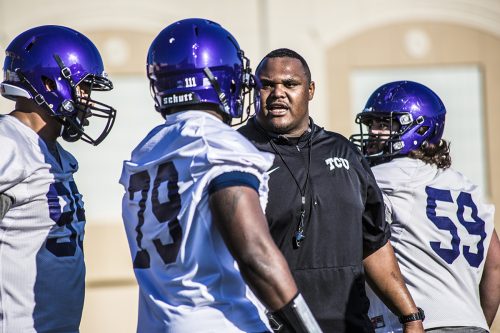
Zarnell Fitch rallies the defensive line. Courtesy of TCU Athletics
On the high school level, I don’t mind saying that if we keep giving high school coaches an opportunity, you will see it will be a continuing trend to see those guys successful, just the work ethic. When I was a high school head coach, I was washing clothes, getting together the PT, making sure the guys have food, a lot of different things other than coaching.
I think on the college level it’s the same thing. If you come in here thinking you’re just going to be a coach, you’re going to have to wear different helmets. You’re going to have to be a psychologist certain days, a counselor. It all depends. I think that high school coaches and college coaches have a lot of similarities.
People, athletes in particular, talk about how coaches are some of the most influential people in their lives, especially young men who don’t have a stable father figure. They pick the coach out as the person who nurtured and developed them.
I agree with that 100 percent. Even as a young man, you’re always searching for that example. Sometimes it’s not by choice. Sometimes it’s just the situation you’re in. It goes back to that person who wants to make a difference.
Just by you saying that, there are people who popped in my head. There are four men that I feel like really wanted to make a difference in my life and they started in high school with Coach Wayne Heath — he actually got to come see me coach in the Oklahoma State game. Then in goes to Swift Fletcher at Navarro junior college. Then you’ve got Chad Glasgow, Shawn Worthen, Coach Patterson. That’s why as a coach, they’re always watching.
What is one of your favorite memories as a TCU football player?
We only had two losing seasons while I was here. One of those seasons was my junior year. Everybody doubted us coming in the next year. Coach P really made us believe we were going to turn around that next year. When we went to go play Oklahoma in 2005 with Adrian Peterson and beat them there, and me being from Oklahoma: priceless.
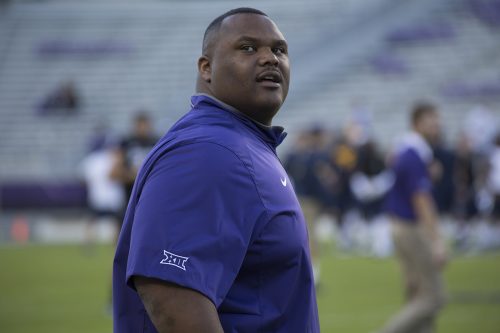
Zarnell Fitch is in his fifth season on the TCU football staff and third year as D-line coach. Courtesy of TCU Athletics
What is one of your favorite memories as a TCU coach?
Just being a part of Coach getting 160 wins. To see that number get hit and counting, but to see that number and to be on the staff when he does it: priceless. I had a ball made that’s at my house that says just to be a part of that staff and to get the win and the next one, and to be part of history is a big deal. It’s a big deal when you’re coaching for a Hall of Famer.
Tell me about your nickname Mayonnaise.
I had a sense of humor. That was an old made-up nickname just to make it fun. It came about that I loved being on the field every day. Any way or any how I could get the guys to be excited for practice I would stand up and on the stretch lines, after I would stretch I would stand up and say, “Mayonnaise is here to play!” It was more of a thing that I didn’t mind climbing on myself to get everybody going. I gave it to myself. I cannot stand mayonnaise. Everybody knows I can’t have it in my icebox. I don’t eat it on anything. I can’t stand it. I’d give them a “Hey, it’s Mayonnaise!” and we’d start dancing and having a good time at practice. Everybody would say, “Yeah, Mayonnaise!” It got everyone up — us, the coaches. Every day in practice I didn’t mind saying something so we could get everybody up so we could practice. It’s just one of those little things you say or do just to get the practice energy up.
Do you ever bring out Mayonnaise to motivate the guys when they’re down?
No. They always ask me little things. I tell them no, I’m Coach Fitch now. They all call me Coach Z. They kind of know I don’t play. My guys have some really cool nicknames in my group.
When you played for TCU, you were a nose guard.
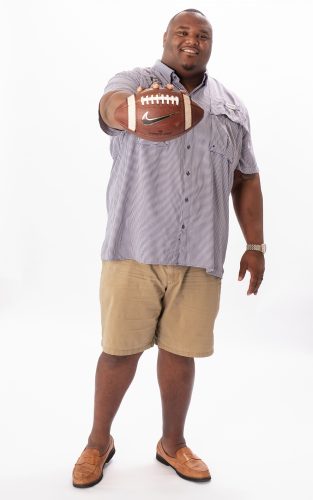
Zarnell Fitch played for TCU as an undergrad and maintained his relationships with the coaching staff as he played in the NFL. Photo by Glen E. Ellman
The fun fact about that is when I went here I wore No. 57. I started on nose guard. The starting nose guards after I left here wore that number. So it was Cory Grant after me, then Davion Pierson, who is from Oklahoma City by where I’m from. We went to rival high schools. That is one of the things I’m most proud of, that I was here for his junior and senior year and got to be a part of him leaving and him having my number. But that’s also when it stopped.
I didn’t want that pressure of one of the guys I coach now to wear my number. It might change, but ’til now we aren’t about to give that number. Not since I became a coach. If there are guys who want to wear that number or they wore it in high school, then they will probably change the situation. It’s a lot of pressure. Every single one of them who wore the number was a champion. The last one was a Big 12 champion.
There’s a lot of history and that’s why I have to remind the kids that you have to understand the history and the work ethic that was put in by not only the coaches but the players, the staff, the entire school to make TCU what it is today, and we’re not satisfied.
A lot of the stuff that we see right now that our head coach told us we were going to get as a kid. As a kid you say, “Yeah, right.” But to come back and be a part of it and see that everything he said we were going to have, we have it. And it’s steadily getting better and better. Weight room, indoor facility, they’re redoing the locker room right now. To see that trickle around everything at TCU. You come back and see our baseball and our basketball arena.
We don’t have to shy away from anybody in recruiting. We don’t have to shy away from anybody in the country. From our school and its prestige, and from our athletics department, we’re not scared to recruit against anybody.
— Trisha Spence
Editor’s Note: The questions and answers have been edited for length and clarity.

Your comments are welcome
Comments
Related reading:
Alumni, Sports: Riff Ram
First Person with Lindsay Shoulders Westbrook ’06
The spirit coordinator and Showgirls director brought the iconic white boots to Horned Frog game day.
Features
Miguel Cruz, Elvis Gallegos Bring TCU Football to Spanish Speakers
Broadcasters bring information, excitement and Latin spice to the airwaves on game day.
Mem’ries Sweet
It’s a boy. It’s a dog. It’s SuperFrog!
Over the course of a century, the TCU mascot has varied in design and species.